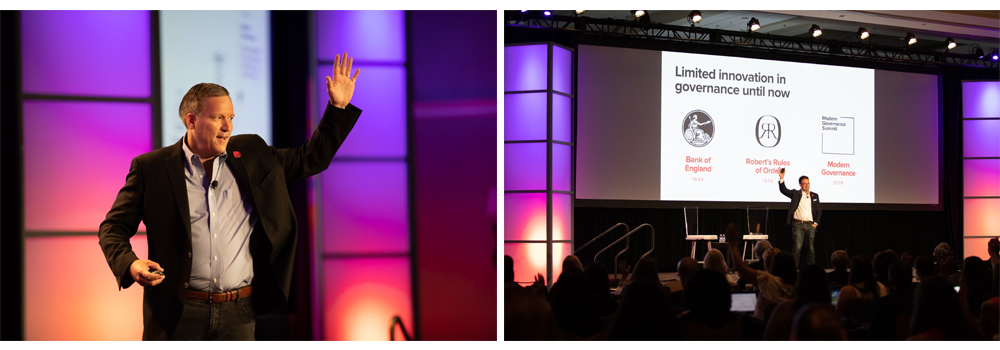From our perspective, the Modern Governance Summit was a success. We had the opportunity to connect with Diligent customers from around the world, share exciting new product developments, and participate in thought leadership across a series of speakers and panels. Bringing together general counsels, corporate secretaries, board administrators, and other legal professionals, the Modern Governance Summit focused on how the role of today's governance professional is evolving in the digital era.
[embed]https://youtu.be/AsVt18jIOwg
[/embed] The challenges facing today's organizations are myriad: cyber threats are becoming more advanced, shareholders are becoming more active, and social media has given rise to a 24-hour news cycle. As the business landscape grows more complex, the benefits of good governance are discernible: When organizations have access to the right data and the right tools, company leaders can be less reactive and more strategic. We call this modern governance, the practice of empowering leaders with the technology, insights, and processes they need to make the right decisions.
So, what's your role in modern governance? How can today's governance professionals begin to drive real change across their organization? In this Summit recap, we compiled key themes from the three-day conference. Here are five things you can do to drive modern governance at your organization:
In her panel on board composition and refreshment, board member Andrea Weiss emphasized how all these governance processes come together to form the basis for board effectiveness:
Today's organizations are drowning in data, but starving for insights. Throughout the Modern Governance Summit, Diligent teams showcased several new features designed to help governance professionals improve visibility across several key areas:
'Boards aren't always going to say, 'We need more information on this,'' said Washington. 'It's your job to have your finger on the pulse and be proactive. And you don't always get to choose what those topics are; stakeholders will.'
In our panel on governance and crisis management, Cindy Moehring, Former Global Chief Ethics Officer for Walmart, emphasized the importance of preparation and practice: 'A crisis doesn't happen everyday,' said Moehring. 'So you have to exercise those muscles that will need to kick in.'
Is your board and management team prepared for the range of crises that could befall? How can modern governance be a competitive advantage in this scenario?
Governance professionals must ensure that new board members are briefed on crisis management plans, said panelist Anastassia Lauterbach, board member for Wirecard, EasyJet, and Censhare. 'Crisis management needs to be a formal part of the induction process.'
The panel kept circling back to this notion of trust'and why it becomes so important in times of crisis. Yet, the process for building trust must start in times of smooth sailing:
View the full list of Modern Governance 100 recipients.  Speakers and panelists encouraged today's governance professionals to lean in across a number of areas: honing the board evaluation process, evolving the format for board materials and meetings, providing strategic insights to drive board succession planning, taking an active role in board education.
Speakers and panelists encouraged today's governance professionals to lean in across a number of areas: honing the board evaluation process, evolving the format for board materials and meetings, providing strategic insights to drive board succession planning, taking an active role in board education.
Diligent's VP of Thought Leadership Dottie Schindlinger pointed to Pamela Coles, chief governance officer and company secretary for Rolls Royce Holdings, as an example of someone who continues to innovate governance processes and board programs. Don't miss her recent interview on The Corporate Director Podcast.
[embed]https://youtu.be/AsVt18jIOwg
[/embed] The challenges facing today's organizations are myriad: cyber threats are becoming more advanced, shareholders are becoming more active, and social media has given rise to a 24-hour news cycle. As the business landscape grows more complex, the benefits of good governance are discernible: When organizations have access to the right data and the right tools, company leaders can be less reactive and more strategic. We call this modern governance, the practice of empowering leaders with the technology, insights, and processes they need to make the right decisions.
So, what's your role in modern governance? How can today's governance professionals begin to drive real change across their organization? In this Summit recap, we compiled key themes from the three-day conference. Here are five things you can do to drive modern governance at your organization:
1. Examine the governance structure you've inherited.
When you arrived at your organization, there was likely an existing set of governance practices and tools in place. The first step to driving modern governance is evaluating the existing governance structure and identifying where it may be falling short. How effective are the procedures and tools you have in place? Board evaluations, board education, new director onboarding, entity management'these are all processes that today's governance professionals have the power to impact and refine.In her panel on board composition and refreshment, board member Andrea Weiss emphasized how all these governance processes come together to form the basis for board effectiveness:
Has your board or organization grown complacent in these areas? What could complacency be costing you?
'You should feel empowered to put forward ideas around education and refreshment. That infrastructure is going to help facilitate some of the changes that we're all looking for.' - Andrea Weiss, Board Member, Cracker Barrel, Bed, Bath & Beyond, RPT Realty and O'Reilly Auto Parts
2. Focus on enhancing visibility.
The guiding principle of modern governance is that when company leaders have the right information at the right time, they're able to make the right decisions. How are you enhancing the visibility for your board and management team?Today's organizations are drowning in data, but starving for insights. Throughout the Modern Governance Summit, Diligent teams showcased several new features designed to help governance professionals improve visibility across several key areas:
- Peer groups & proxy advisor recommendations: How does your board rank against its peer group'particularly from a proxy advisor's point of view? Diligent Nominations offers the external perspective: a snapshot of your board's effectiveness with opportunities to dive deep on potential conflicts of interest, proxy advisor red flags, and various governance metrics.
- Reputation, media coverage & regulatory developments: Have you equipped your organization with tools that allow them to monitor company reputation? Environmental scanning is a critical function today, as it can help boards and executives detect a crack in media coverage before it becomes a flood. With Diligent Governance Intel, governance professionals curate news, industry trends, and regulatory developments relevant to each user.
- Best practices & boardroom trends: The GC and corporate secretary are responsible for helping the board to see around the corner. How are you delivering thought leadership and educational resources to your board members? Diligent Insights (a free offering in your Diligent app) equips your board with a library of articles, videos and research from Diligent and leading industry partners like NACD, PwC's Governance Insights Center, and Spencer Stuart.
3. Anticipate the changes ahead.
It's your job to help company leaders see around the corner. As the regulatory and shareholder landscapes evolve, how can you help the board and management team interpret the changes ahead? In his panel, Paul Washington, Executive Director of The Conference Board ESG Center, explained how the governance professional's responsibilities were expanding:'More is being expected of boards, so boards are going to be expecting more of you. But you're not just going to be working with boards, but rather with all stakeholders. And you're not just covering governance issues, but social and environmental issues, too.'Washington and fellow panelist Lynn Beauregard, CEO, Governance Professionals of Canada, described a stakeholder-centric model for governance that today's GCs and corporate secretaries would have to help their organizations implement.
- Paul Washington, Executive Director of The Conference Board ESG Center
'Boards aren't always going to say, 'We need more information on this,'' said Washington. 'It's your job to have your finger on the pulse and be proactive. And you don't always get to choose what those topics are; stakeholders will.'
4. Prepare for the worst.
A number of organizations lack sufficient plans for crisis management. From cyber breaches to natural disasters to employee misconduct, the list of things that can go wrong is growing. Governance professionals play an important role in both detecting and mitigating these risks.In our panel on governance and crisis management, Cindy Moehring, Former Global Chief Ethics Officer for Walmart, emphasized the importance of preparation and practice: 'A crisis doesn't happen everyday,' said Moehring. 'So you have to exercise those muscles that will need to kick in.'
Is your board and management team prepared for the range of crises that could befall? How can modern governance be a competitive advantage in this scenario?
Governance professionals must ensure that new board members are briefed on crisis management plans, said panelist Anastassia Lauterbach, board member for Wirecard, EasyJet, and Censhare. 'Crisis management needs to be a formal part of the induction process.'
The panel kept circling back to this notion of trust'and why it becomes so important in times of crisis. Yet, the process for building trust must start in times of smooth sailing:
'It all comes back to trust. If you don't take the time to interact with your board members and get to know them, they're not going to trust you in times of confidence. I encourage you to build that trust, so that when they have an issue, they'll pick up the phone and call you.' - Ellen Whittemore, Executive Vice President, General Counsel and Secretary, Wynn Resorts
5. Recognize your opportunities and take them.
During the Modern Governance Summit, we took the time to recognize 100 outstanding governance professionals as part of our new program, the Modern Governance 100. These individuals were all nominated by their board members, executives, and peers for driving real change across their organizations. Among the nominations we received:- '[She] continues to innovate the format of our meetings.'
- '[He] has completely overhauled our approach to corporate governance over the last several years, resulting in a very efficient and effective process.'
- '[She] has a great sense of priorities around risk management. And she gives fearlessly good advice.'
- '[He] enables us to make important decisions with speed and precision.'
- '[She] navigates the strong personalities of the board members very well and knows when and how to challenge the business.'
- '[He] provides dispute resolution on board matters in a fashion that has garnered earned respect from all board members.'
- '[She] anticipates the needs of the board.'
 Speakers and panelists encouraged today's governance professionals to lean in across a number of areas: honing the board evaluation process, evolving the format for board materials and meetings, providing strategic insights to drive board succession planning, taking an active role in board education.
Speakers and panelists encouraged today's governance professionals to lean in across a number of areas: honing the board evaluation process, evolving the format for board materials and meetings, providing strategic insights to drive board succession planning, taking an active role in board education.Diligent's VP of Thought Leadership Dottie Schindlinger pointed to Pamela Coles, chief governance officer and company secretary for Rolls Royce Holdings, as an example of someone who continues to innovate governance processes and board programs. Don't miss her recent interview on The Corporate Director Podcast.





